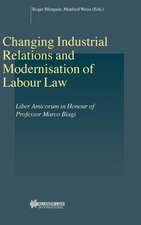Bargaining Power
Autor Roderick Martinen Limba Engleză Hardback – 8 oct 1992
Preț: 831.76 lei
Preț vechi: 1263.35 lei
-34% Nou
Puncte Express: 1248
Preț estimativ în valută:
159.16€ • 166.59$ • 132.47£
159.16€ • 166.59$ • 132.47£
Carte tipărită la comandă
Livrare economică 19-25 martie
Preluare comenzi: 021 569.72.76
Specificații
ISBN-13: 9780198272557
ISBN-10: 0198272553
Pagini: 210
Ilustrații: 3 line drawings, 13 tables
Dimensiuni: 164 x 244 x 17 mm
Greutate: 0.5 kg
Ediția:New.
Editura: Clarendon Press
Colecția Clarendon Press
Locul publicării:Oxford, United Kingdom
ISBN-10: 0198272553
Pagini: 210
Ilustrații: 3 line drawings, 13 tables
Dimensiuni: 164 x 244 x 17 mm
Greutate: 0.5 kg
Ediția:New.
Editura: Clarendon Press
Colecția Clarendon Press
Locul publicării:Oxford, United Kingdom
Recenzii
In this ambitious book, Roderick Martin follows a comparative institutionalist approach in describing how the major institutions governing capitalist economies were constructed and key features of their business systems changed. He discusses four CEE countries, Poland, the Czech Republic, Hungary, and Romania, in the roughly 20 years since the collapse of the Soviet Union. Constructing Capitalisms focuses on four major features, or axes, of structural change, in these political economies: property ownership, means of capital allocation and accumulation, conditions governing access to and mode of involvement in local, national, and international markets and production systems, and the differentiation of economic activities from the state.
























